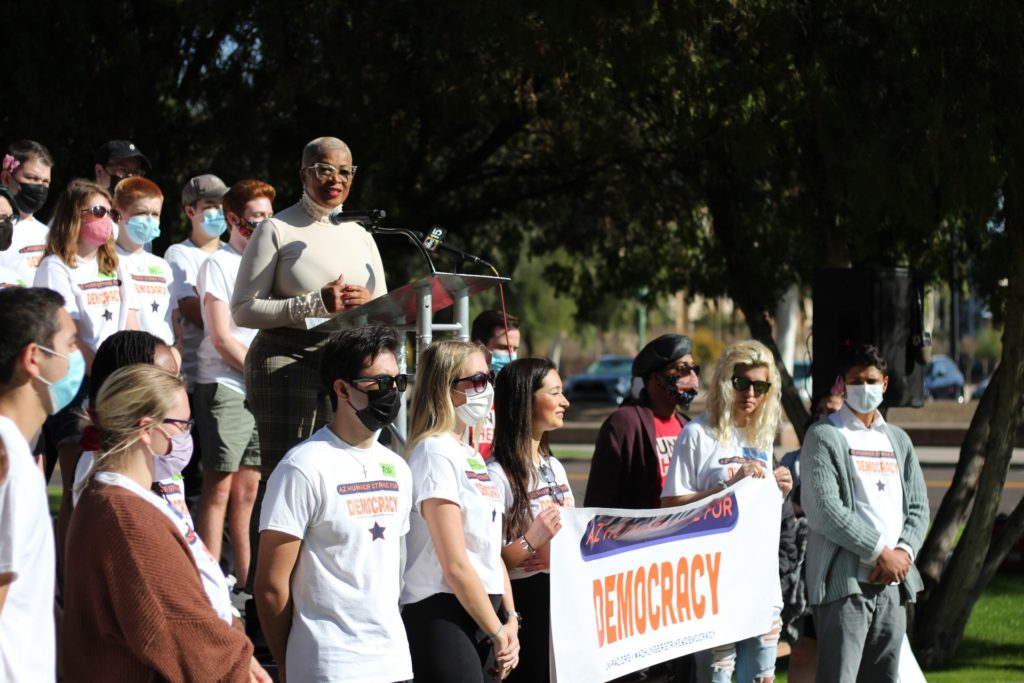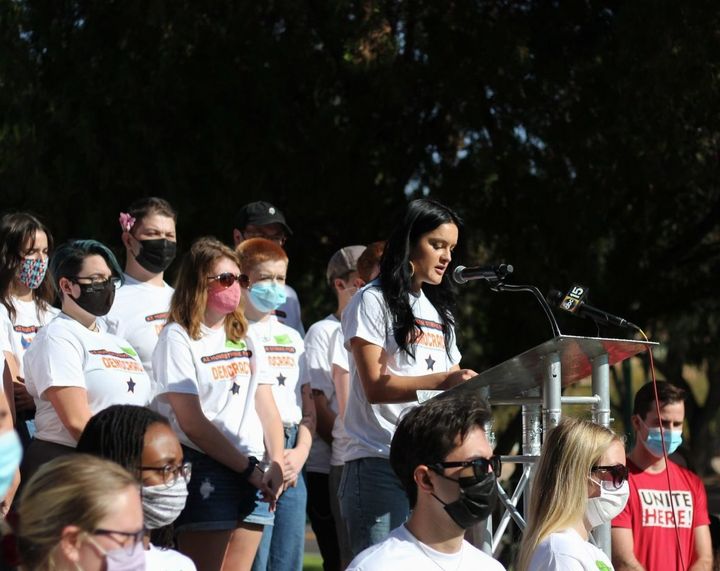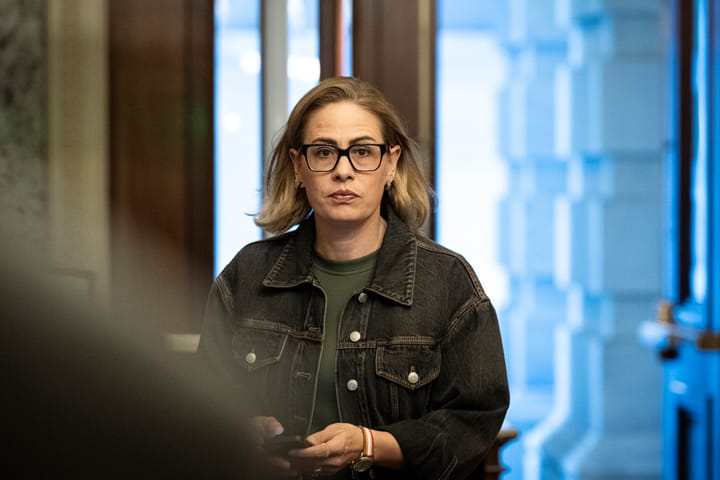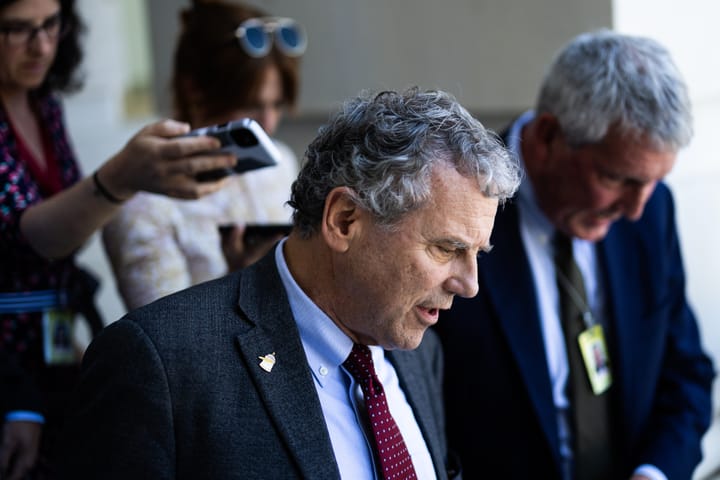Election reform legislation is stymied in the U.S. Senate, where three major voting rights bills this year have been blocked from advancing to a debate by Republican filibusters.
In Arizona, a group of activists has launched a campaign to break through Senate obstruction and protect access to the ballot box. On Nov. 5, 20 college students and young people at the Arizona Capitol began an indefinite hunger strike to compel the Biden administration and Senate Democrats to change the Senate’s rules in order to pass the Freedom To Vote Act before the end of the year. The action is being organized by Un-PAC, a nonprofit that employs student organizers to educate their peers on democracy reform issues.
A key opponent to changing Senate rules in order to overcome the filibuster’s 60-vote threshold is first-term Arizona Democrat Kyrsten Sinema, who says she supports the bill but continues to resist a change to procedures. Last month, Republicans blocked debate on another bill that would restore some protections under the Voting Rights Act.
Our futures hang in the balance of the Senate’s decision to restore their rules and pass this bill this year.
Georgia Linden, University of Arizona student
The Freedom to Vote Act was a compromise negotiated with Sen. Joe Manchin (D-W.V.), who joined as a cosponsor. The bill would address voter suppression efforts by expanding voting access, banning partisan gerrymandering of congressional districts, increasing disclosure of “dark money” spending in elections, and more. To bring it to a vote, Senate Democrats could employ “reform by ruling” with a majority by unanimously agreeing that the filibuster is a violation of Senate rules and create a “carve-out” for certain types of bills, like ones that address election access. Sinema and several other Democrats disfavor such a step.
The hunger strikers in Phoenix tell Sludge that their goal is to push back against the influence of Big Money in the political system and secure a meeting with the Biden White House to confirm that the passage of democracy protections is a top priority. They plan to hold news conferences every day highlighting community members impacted by issues like dark money in elections and the erosion of voting access.
“As a 20 year old, we as a generation believe it’s time to do something about protecting democracy, especially if our leaders in D.C. are not going to take a stand,” said Lauren Dorn, an Arizona State University student and spokesperson for Un-PAC. “I grew up in a post-9/11 era, where extremism and volatile rhetoric on the part of our political leaders is something I’m familiar with.”
Dorn, who is participating in the hunger strike, says that the cross-partisan Arizona group has been planning to start their action for weeks, and have medical staff available for protestors. The Senate has a state work period scheduled to start next week and the group is pressing for a meeting with Sinema and her office.
“We need Sen. Sinema and the Biden administration to understand that protecting democracy is not a partisan issue. Our democracy should represent the people and not dark money and special interests—voters should pick politicians and not the other way around, and I hope our voices do not go unnoticed,” Dorn said.
Sinema’s office released a statement to local news saying, “I appreciate all Arizonans engaging in our public discourse and policy and encourage young Arizonans to stay engaged in ways that protect their health and safety.”
Allie Young, a voting rights activist in Arizona, told The Guardian last month that she and other longtime colleagues of Sinema in state politics have been flummoxed by the senator’s unreachability in D.C., especially on voting rights issues. This year, Sinema has ducked questions from constituents and public forums while packing her schedule with corporate fundraising events.
So far this year, at least 19 states have enacted 33 new laws that restrict access to voting, the nationwide survey from the Brennan Center found, and in over 20 states more than 245 similar bills stand to be brought into next year’s legislative sessions.
The Freedom to Vote Act, sponsored by Senate Judiciary Committee member Amy Klobuchar (D-Minn.), is a revamped attempt to reach the 60 vote threshold for consideration of a voting rights and election reform package. Many of the bill’s reforms were included in the Democrats’ signature For the People Act, which was full of Democratic campaign pledges and passed by the U.S. House in March, but was twice blocked this summer by a Republican filibuster.
“Arizona has had independent redistricting since 2011,” Dorn said, praising it as a model for other states. “This bill is focused on getting big money out of politics and eliminating dark money, and that’s what’s attracting young people to this movement, we’re not oblivious to what’s going on,” Dorn said. Among its provisions to expand voting, the Freedom to Vote Act would make Election Day a national holiday, a reform that Dorn highlighted as cross-partisan in its support. An April Pew poll found that sizable majorities of Americans favor several policies designed to make it easier to register and vote, though registered Republicans increasingly oppose some ideas like automatic voter registration.

“Without getting dark money out of politics and protecting our freedom to vote, our democracy will crumble,” said University of Arizona student Georgia Linden in a statement. “Our futures hang in the balance of the Senate’s decision to restore their rules and pass this bill this year. Our senators must meet their responsibility to represent us, not be swayed by the broken, partisan divide in D.C.”
Last month, a Brennan Center report outlined the ways that the Freedom to Vote Act would take away the ability for partisan operatives to suppress votes, including by establishing clear national standards on early voting, vote by mail, and the counting of ballots.
Also last month, a group of 150 scholars of U.S. democracy published a letter urging the Senate to carve out a majority rule to pass the Freedom to Vote Act ahead of the midterm elections. A Washington Post survey last updated in August found that Manchin and Sinema are the lone Senate Democratic caucus members who oppose weakening the filibuster rule.



